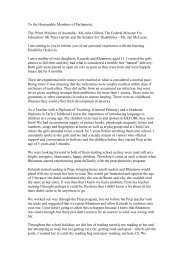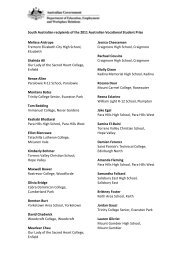Belonging, Being and Becoming - Early Years Learning Framework
Belonging, Being and Becoming - Early Years Learning Framework
Belonging, Being and Becoming - Early Years Learning Framework
You also want an ePaper? Increase the reach of your titles
YUMPU automatically turns print PDFs into web optimized ePapers that Google loves.
PRINCIPLES<br />
The following are fi ve Principles that refl ect<br />
contemporary theories <strong>and</strong> research evidence<br />
concerning children’s learning <strong>and</strong> early<br />
childhood pedagogy. The Principles underpin practice<br />
that is focused on assisting all children to make<br />
progress in relation to the <strong>Learning</strong> Outcomes.<br />
1. Secure, respectful <strong>and</strong><br />
reciprocal relationships<br />
Educators who are attuned to children’s thoughts<br />
<strong>and</strong> feelings, support the development of a strong<br />
sense of wellbeing. They positively interact with the<br />
young child in their learning.<br />
Research has shown that babies are both vulnerable<br />
<strong>and</strong> competent. Babies’ fi rst attachments within<br />
their families <strong>and</strong> within other trusting relationships<br />
provide them with a secure base for exploration<br />
<strong>and</strong> learning.<br />
Through a widening network of secure<br />
relationships, children develop confi dence <strong>and</strong> feel<br />
respected <strong>and</strong> valued. They become increasingly able<br />
to recognise <strong>and</strong> respect the feelings of others <strong>and</strong><br />
to interact positively with them.<br />
Educators who give priority to nurturing<br />
relationships <strong>and</strong> providing children with<br />
consistent emotional support can assist children<br />
to develop the skills <strong>and</strong> underst<strong>and</strong>ings they<br />
need to interact positively with others. They also<br />
help children to learn about their responsibilities<br />
to others, to appreciate their connectedness<br />
<strong>and</strong> interdependence as learners, <strong>and</strong> to value<br />
collaboration <strong>and</strong> teamwork.<br />
2. Partnerships<br />
<strong>Learning</strong> outcomes are most likely to be<br />
achieved when early childhood educators work<br />
in partnership with families. Educators recognise<br />
BECOMING<br />
12 BELONGING, BEING & BECOMING The <strong>Early</strong> <strong>Years</strong> <strong>Learning</strong> <strong>Framework</strong> for Australia<br />
LEARNING OUTCOMES<br />
BELONGING<br />
CHILDREN’S<br />
LEARNING<br />
PRACTICE<br />
PRINCIPLES<br />
that families are children’s fi rst <strong>and</strong> most infl uential<br />
teachers. They create a welcoming environment<br />
where all children <strong>and</strong> families are respected <strong>and</strong><br />
actively encouraged to collaborate with educators<br />
about curriculum decisions in order to ensure that<br />
learning experiences are meaningful.<br />
Partnerships are based on the foundations of<br />
underst<strong>and</strong>ing each other’s expectations <strong>and</strong><br />
attitudes, <strong>and</strong> build on the strength of each others’<br />
knowledge.<br />
In genuine partnerships, families <strong>and</strong> early childhood<br />
educators:<br />
• value each other’s knowledge of each child<br />
• value each other’s contributions to <strong>and</strong> roles in<br />
each child’s life<br />
• trust each other<br />
• communicate freely <strong>and</strong> respectfully with<br />
each other<br />
• share insights <strong>and</strong> perspectives about each child<br />
• engage in shared decision-making.<br />
Partnerships also involve educators, families <strong>and</strong><br />
support professionals working together to explore<br />
the learning potential in every day events, routines<br />
<strong>and</strong> play so that children with additional needs<br />
are provided with daily opportunities to learn<br />
from active participation <strong>and</strong> engagement in these<br />
experiences in the home <strong>and</strong> in early childhood or<br />
specialist settings.<br />
3. High expectations <strong>and</strong> equity<br />
<strong>Early</strong> childhood educators who are committed to<br />
equity believe in all children’s capacities to succeed,<br />
regardless of diverse circumstances <strong>and</strong> abilities.<br />
Children progress well when they, their parents<br />
<strong>and</strong> educators hold high expectations for their<br />
achievement in learning.<br />
BEING





